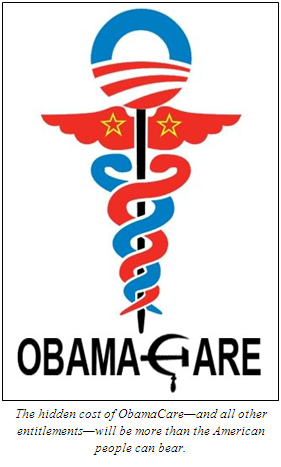It’s an absurd figure to look at, let alone to begin planning to somehow pay for. Yet, such is the hidden cost of entitlements—at least the cost that the Board of Trustees for Medicare and Social Security is now willing to admit to.
And make no mistake about it: It is a cost that will bury the public treasury—along with the taxpayers expected to foot the astronomical, insurmountable bill.
The basic lesson here is that when something—whether it be health care or retirement funds—is guaranteed to everybody, it goes ever deeper into the red.
Far, far into the red. That is why entitlements are not—and never can or will be—deficit “neutral.” The total cost is not how much money is allocated by Congress, but how much money Congress promises to continue paying out through the entitlement for decades and decades to come.
The irony is that the $104 trillion price tag, horrendous as it is, may actually be small in comparison to what Americans will really be forced to pay once the new government-run health care plan is implemented.
Consider this: Under the House version of the so-called public “option,” individuals up to 400 percent of the poverty level, or making approximately $43,320 or less annually, will be eligible for some level of health coverage under the plan whether through the public “option,” Medicaid, or otherwise.
There’s a small problem. As of 2006, there were approximately 91.5 million people aged 25-65 who fell into that income bracket, according to the U.S. Census Bureau. Factor in the nearly 35 million who were 65 and older at that time, and the total figure comes to over 125.8 million who will be eligible for government-administered health care.
And once the new so-called public “option” crowds out and eliminates all other private health options (as the program’s sponsors fully expect it to do according to page 16 of the bill), sooner or later the total entitlement will extend to all Americans.
The cost to taxpayers? Far, far more than we can possibly bear.
Presently, the average premium for single coverage is $4,700, according to the National Coalition on Health Care. If all 125.8 million of those eligible received fully-funded “average” health plans, the total burden to taxpayers would rise to a staggering $591.26 billion annually.
But let’s just deal with the 91.5 million aged 25-65. They alone would cost the taxpayers $430.05 billion annually. This means that if nothing else changed—the population, inflation, the average cost of premiums, etc.—by 2080, the unfunded liabilities would rise to $30.1 trillion above the Board of Trustees’ current $104 trillion estimate. But, of course, that’s a low-ball figure, since the population will rise, inflation will increase, and undoubtedly so, too, will the cost of the average premium.
Of course, Barack Obama is ever-optimistic. Or, perhaps, simply duplicitous. Just a week ago, he said, “I’ve said that it’s got to be budget neutral, it’s got to be deficit neutral, and so whatever bill is produced has to be paid for, and that creates some difficulties because people would like to get the good stuff without paying for it.”
Well, that’s one way of putting it. The fact is, once the hidden costs of these entitlements—Social Security, Medicare, and the public “option”—are fully realized over the next century, the American people will not be getting anything good at all—including the most basic health care we now take for granted. A country that has been plunged into decade after decade of half-trillion dollar annual deficits won’t have a plug nickel left for adequate health care—and barely enough left for funeral expenses.
Robert Romano is the ALG Senior News Editor.


